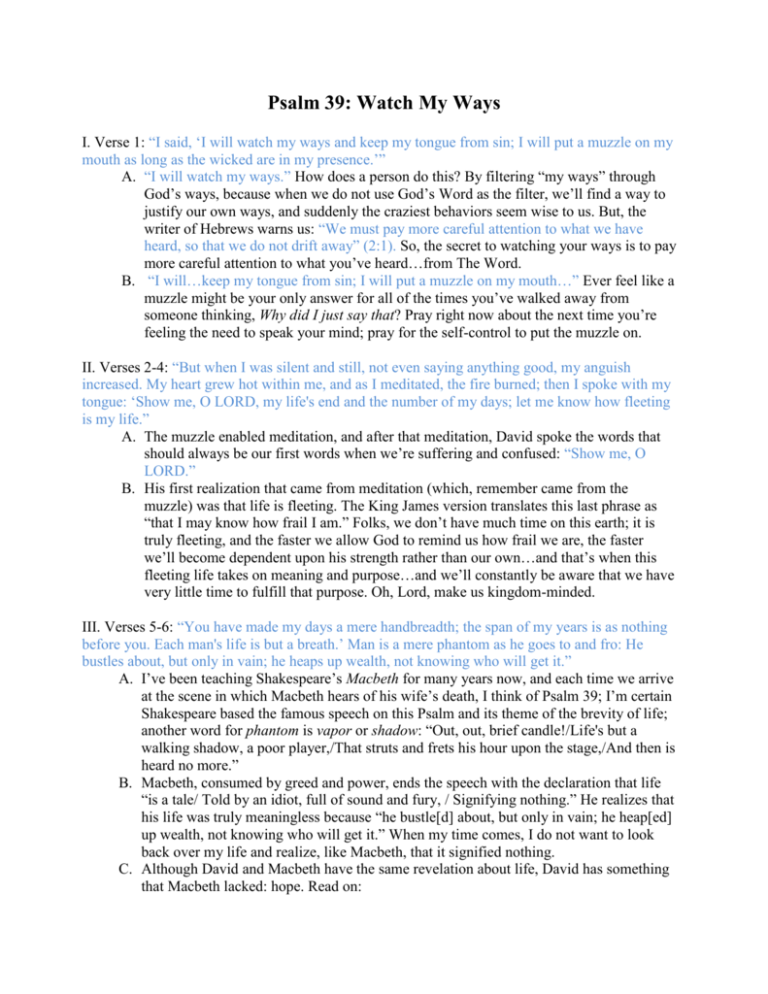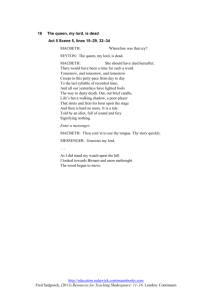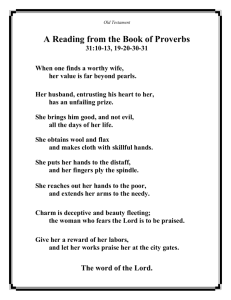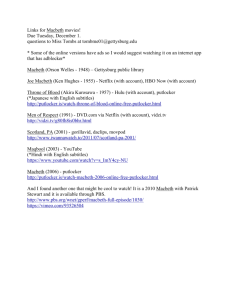Psalm 39
advertisement

Psalm 39: Watch My Ways I. Verse 1: “I said, ‘I will watch my ways and keep my tongue from sin; I will put a muzzle on my mouth as long as the wicked are in my presence.’” A. “I will watch my ways.” How does a person do this? By filtering “my ways” through God’s ways, because when we do not use God’s Word as the filter, we’ll find a way to justify our own ways, and suddenly the craziest behaviors seem wise to us. But, the writer of Hebrews warns us: “We must pay more careful attention to what we have heard, so that we do not drift away” (2:1). So, the secret to watching your ways is to pay more careful attention to what you’ve heard…from The Word. B. “I will…keep my tongue from sin; I will put a muzzle on my mouth…” Ever feel like a muzzle might be your only answer for all of the times you’ve walked away from someone thinking, Why did I just say that? Pray right now about the next time you’re feeling the need to speak your mind; pray for the self-control to put the muzzle on. II. Verses 2-4: “But when I was silent and still, not even saying anything good, my anguish increased. My heart grew hot within me, and as I meditated, the fire burned; then I spoke with my tongue: ‘Show me, O LORD, my life's end and the number of my days; let me know how fleeting is my life.” A. The muzzle enabled meditation, and after that meditation, David spoke the words that should always be our first words when we’re suffering and confused: “Show me, O LORD.” B. His first realization that came from meditation (which, remember came from the muzzle) was that life is fleeting. The King James version translates this last phrase as “that I may know how frail I am.” Folks, we don’t have much time on this earth; it is truly fleeting, and the faster we allow God to remind us how frail we are, the faster we’ll become dependent upon his strength rather than our own…and that’s when this fleeting life takes on meaning and purpose…and we’ll constantly be aware that we have very little time to fulfill that purpose. Oh, Lord, make us kingdom-minded. III. Verses 5-6: “You have made my days a mere handbreadth; the span of my years is as nothing before you. Each man's life is but a breath.’ Man is a mere phantom as he goes to and fro: He bustles about, but only in vain; he heaps up wealth, not knowing who will get it.” A. I’ve been teaching Shakespeare’s Macbeth for many years now, and each time we arrive at the scene in which Macbeth hears of his wife’s death, I think of Psalm 39; I’m certain Shakespeare based the famous speech on this Psalm and its theme of the brevity of life; another word for phantom is vapor or shadow: “Out, out, brief candle!/Life's but a walking shadow, a poor player,/That struts and frets his hour upon the stage,/And then is heard no more.” B. Macbeth, consumed by greed and power, ends the speech with the declaration that life “is a tale/ Told by an idiot, full of sound and fury, / Signifying nothing.” He realizes that his life was truly meaningless because “he bustle[d] about, but only in vain; he heap[ed] up wealth, not knowing who will get it.” When my time comes, I do not want to look back over my life and realize, like Macbeth, that it signified nothing. C. Although David and Macbeth have the same revelation about life, David has something that Macbeth lacked: hope. Read on: III. Verses 7: “But now, Lord, what do I look for? My hope is in you.” A. You see, life only signifies nothing if the answer to “what do I look for?” is worldly wealth. B. David’s answer was “My hope is in you,” and I pray you will honestly ask yourself the question, “What am I looking for?” Am I bustling in vain, trying to store up wealth? C. Dr. Warren Wiersbe, “Life is swift, life is short, and for most people, life is futile. In modern vocabulary, people are living for the image and not the reality.” David’s hope was in the reality; his hope was in God Almighty. IV. Verses 8-11: “Save me from all my transgressions; do not make me the scorn of fools. I was silent; I would not open my mouth, for you are the one who has done this. Remove your scourge from me; I am overcome by the blow of your hand. You rebuke and discipline men for their sin; you consume their wealth like a moth— each man is but a breath.’” A. Once again, we’re reminded that God disciplines those he loves; when a parent does not discipline, that parent neglects rather than loves his child, because he chooses to do what is easiest on him rather than what is best for the child, and that is not love. B. God does love us; he loved David, and he disciplined him. David did not open his mouth about the discipline for the same reason I never opened mine when my earthly father was disciplining me; it was deserved, so it was just, and the one wielding the blow had the authority to do so, and I respected the authority which exercised love through discipline. V. Verses 12-13: “‘Hear my prayer, O LORD, listen to my cry for help; be not deaf to my weeping. For I dwell with you as an alien, a stranger, as all my fathers were. Look away from me, that I may rejoice again before I depart and am no more.’ A. So, David turns to God’s mercy; he has repented, asked to be saved from his sin, and there’s nothing after that we can do but lean on God’s mercy and grace, because we deserve neither! B. But, like David, we are to be aliens and strangers here; we’re not to be caught up in the bustling about in vain, heaping up wealth. C. Pay attention to the phrase “dwell with you.” We are strangers to this World, but we are not alone; if we’re truly aliens here, then we’re remaining, or dwelling, with The Vine, and Jesus make it clear, “Remain in me, and I will remain in you. No branch can bear fruit by itself; it must remain in the vine. Neither can you bear fruit unless you remain in me. I am the vine; you are the branches. If a man remains in me and I in him, he will bear much fruit; apart from me you can do nothing” (John 15: 4-5). May you Never Be apart From The True Vine. Otherwise, Life Signifies Nothing.







